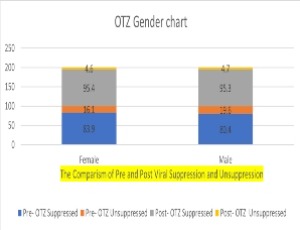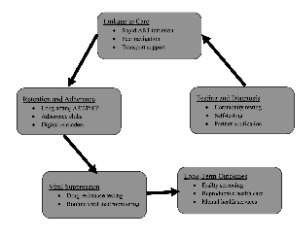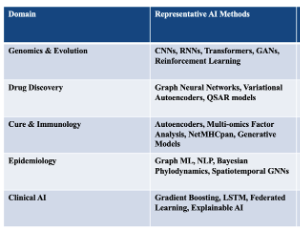Loading
Journal of AIDS and HIV Treatment
ISSN: 2688-7436
Latest Articles
Perceptions and Knowledge of HIV/AIDS Among Black Women: An Exploratory Study
Erica Campbell , Nizejai Anderson
Black women in the United States face disproportionate rates of HIV/AIDS, with higher new infection rates and poorer health outcomes compared to other racial and gender groups. This study seeks to explore the perceptions and knowledge surrounding HIV/AIDS among Black women, to contribute to social work and public health knowledge. By identifying gaps in awareness and understanding of the distinct challenges Black women face regarding HIV/AIDS, this study provides valuable insight to inform the development of targeted interventions and policies to mitigate the impact of HIV/AIDS.
J AIDS HIV Treat, 2025, Volume 7, Issue 1, p1-12 | DOI: 10.33696/AIDS.7.055
Disclosing Sexual Partner's HIV/AIDS Status before Sexual Activity: A Cross-sectional Study on Factors Affecting Confidence
Mbwiga Sote Aloni , Orestes Silverius Kapinga
Background: Human immunodeficiency virus (HIV) can be transmitted through the exchange of body fluids with persons who are HIV positive. For the sake of prevention and care, disclosing the partner’s HIV status is crucial. Most sexual partners face difficulties in inquiring about the HIV status of their sexual partners. Partner’s negative reaction, stigma, and fear of judgment deter the sexual partners discussions on HIV status. The study assessed factors affecting confidence in enquiring about the HIV/AIDS status before sexual activity.
J AIDS HIV Treat, 2025, Volume 7, Issue 1, p13-21 | DOI: 10.33696/AIDS.7.056
Determination of Anthropometric and Immune Inflammatory Responses in Patients on Dolutegravir Based Antiretroviral Therapy at University of Nigeria Teaching Hospital Ituku-Ozalla
Chima O. Onwuka-Kalu , Ejike F. Chukwurah
Dolutegravir, an integrase strand transfer inhibitor has been found to affect anthropometric indices. A total of 40 subjects comprising 19 male and 21 female were recruited for the study and apparently healthy sex and age matched individuals who tested sero-negative to HIV screening were used as controls. Standard weighing scale and measuring tape were used to determine body mass index (BMI) and Waist-to-Hip Ratio (WHR). Blood samples were collected and analyzed for pro inflammatory cytokines markers, specifically IL6 and TNF-α.
J AIDS HIV Treat, 2025, Volume 7, Issue 1, p22-26 | DOI: 10.33696/AIDS.7.057
The Performance of a New Multidimensional Frailty Index in Comparison to the Frailty Phenotype to Assess Frailty in People Living with HIV 50 Years of Age and Older in an Urban HIV Clinic
Uzoamaka A. Eke , Katie Wasserstein , Carolyn Susman , Ahizechukwu C. Eke , Kareshma Mohanty , Sarah Schmalzle , Nicole Viviano , Jennifer D Hoffmann , Neha S. Pandit , Robyn Palmeiro , Judith Lee , Alice S Ryan , Kristen A. Stafford , Ann Gruber-Baldini
Background: Frailty is increasingly recognized in older people living with HIV (PLWH), but optimal diagnostics are yet to be determined. Frailty indices (FI) represent an accumulation of health deficits shown to correlate better with mortality and adverse effects of aging than the frailty phenotype or chronological age. Methods: This is a retrospective cohort study of frailty assessments in PLWH aged ≥ 50 years in a multidisciplinary urban HIV clinic. Frailty was assessed using Frailty Phenotype (FP) and a new 40-variable clinical composite FI derived from routine clinical and laboratory data (CCFI).
J AIDS HIV Treat, 2025, Volume 7, Issue 1, p27-37 | DOI: 10.33696/AIDS.7.058
Socio-Demographic Characteristics of Newly Diagnosed People Living with HIV Initiating Antiretroviral Treatment at the Adult Day Hospital of Bobo-Dioulasso Over a Five-year Period
Yacouba Sawadogo , Mafama Siribié , Aicha Savadogo , Hayazouma Hadiaratou Inès Hakiekou , Jessica Julie Chantal Samba , Noutin Fernand Michodigni , Cheick Ahmed Ouattara , Jacques Zoungrana , Armel Poda , Abdoul-Salam Ouédraogo
Background: HIV infection is a major public health problem in sub-Saharan Africa, particularly in Burkina Faso. This study aimed to describe the socio-demographic characteristics of newly person living with HIV initiating antiretroviral treatment at the Adult Day Hospital of Bobo-Dioulasso over a five-year period. Materials and methods: A descriptive cross-sectional study was conducted from 1 January 2016 to 31 December 2020 at the Adult Day Hospital of Bobo-Dioulasso. People newly diagnosed with HIV after confirmatory testing and initiating antiretroviral therapy were included in this study.
J AIDS HIV Treat, 2025, Volume 7, Issue 1, p47-53 | DOI: 10.33696/AIDS.7.060
Creating HOPE: The Development of the HIV, Opioids and Pain Experience (HOPE) Screening Tool
Maria Anjanette Nuñez , Catherine Cronin , Ford J , Maya Fleischer , Wu Y , Erin Reardon , Sara Pullen
Background: People living with HIV (PLWH) are more likely to experience chronic pain, trauma, and analgesic use than their HIV-negative counterparts. This complex chronic pain profile can have subsequent physical, mental, and psychological sequela. Despite this, a tool to rapidly screen at risk patients and refer to specialized care has not been established. The purpose of this scoping review is to identify current screening tools for chronic pain, trauma, and opioid use to guide design of our comprehensive HOPE (HIV, Opioids and Pain Experience) screening tool.
J AIDS HIV Treat, 2025, Volume 7, Issue 1, p38-46 | DOI: 10.33696/AIDS.7.059
Epidemiological, Clinical, Therapeutic and Evolutionary Profile of HIV-infected Patients Monitored at the Center of Excellence of the University of Lubumbashi
Philomène Lungu Anzwal , Dodo Manda Mukendi , Odon Panshi Wa Panshi , Athy Kalumba Kambote , Nathalie Mbuyamba Mutombo , Astrid Lokotshe Kanyama , Jirène Ndibu Ebondo , Salvatrice Masonga Madika , Franck Kasans Tshinyengo , Julie Ilunga , Mbelu Dina , Gloria Malitele Babile , Guy Kandja Lwamba , Eric Ngindu Mankoy , Odile Latshupanda Ampeng , Elie Kabika Yatambo , David Elo Lombe , Djo Banza Monga , Laurent Shamashanga Kwete , Jérôme Nyembo Lukamba , Tony Kayembe Kitenge
Introduction: HIV infection is characterized by the progressive destruction of CD4+ T lymphocytes, responsible for an immune deficiency, thus promoting the development of serious opportunistic infections and tumors. Aim: The objective of this study was to describe the epidemiological, clinical, therapeutic, and disease progression of HIV-infected patients registered and monitored at the Center of Excellence at the University of Lubumbashi. Methods: Retrospective descriptive study, carried out from 2006 to 2024 using patient records registered at the Center of Excellence.
J AIDS HIV Treat, 2025, Volume 7, Issue 1, p65-73 | DOI: 10.33696/AIDS.7.062
Viral Load Suppression and Associated Factors among People Living with HIV on Antiretroviral Therapy in a Tertiary Health Institution in Owo, Southwest, Nigeria
Abiodun J. Kareem , Abel O. Alonge , Ifedayo O. Fasoranti , Adesola O. Kareem , Temitayo O. Bewaji , Akintunde O. Akinyugha , Ikechukwu S. Abazu , Korede O. Oluwatuyi , Babatunde D. Babalola , Olukemi C. Ilori , Victor O. Otor , Patricia I. Eniowo , Akinbowale R. Eniowo
Background: Suppression of Human Immuno-deficiency Virus (HIV) viral load (VL) is essential for preventing disease progression and improved quality of life in persons living with HIV (PLHIV). In 2023, Nigeria had an HIV prevalence rate of 2.1% while Ondo state was 1.1%. No prior characterization of the status of viral load suppression of PLHIV in the Owo, Ondo state has been undertaken. This study aimed to determine the predictors of viral load suppression among PLHIV in Owo, Ondo State, Nigeria.
J AIDS HIV Treat, 2025, Volume 7, Issue 1, p81-89 | DOI: 10.33696/AIDS.7.064
Routine HIV Screening Health Care Assessment in Primary Care in Outpatient Clinics at Southern Puerto Rico
Fabian Ramírez Rivera , Itzamar Pastrana Echevarría , Yolanda Hidalgo Hernández , María Valentín Mari , Paola Vidal Castillo , Stephen Bury Fiol , Carmen Reyes , Rafael Espinet Pérez
Background: Despite established guidelines recommending routine HIV screening for individuals aged 13 to 64 at least once in their lifetime, testing remains underutilized in many primary care settings. Puerto Rico faces a disproportionately high HIV burden, particularly in the southern region, yet limited data exist on screening adherence and patient awareness. This study aimed to evaluate the socio-demographic characteristics and sexual behaviors associated with routine HIV testing among adults in primary care clinics in southern Puerto Rico.
J AIDS HIV Treat, 2025, Volume 7, Issue 1, p74-80 | DOI: 10.33696/AIDS.7.063
The Outcome of Operation Triple Zero Clubs on Viral Load Outcomes among Adolescents Living with HIV: An Interventional Study of ICHSSA-2 Project in Lagos State
Felix N. Iwuala , Elijah O. Idoko , Doreen Magaji , Esther O. Brodrick-Shehu , Inioluwa O. Johnson , Ayotunde Akinwumi-Omidiji , Olakunle Osinowo , Ayokanmi J. Mobereade , Gbadegesin O. Alawode , Chika Obiora-Okafo , Moses Katbi , Jemeh Pius , Tosin Idaboh , Omosalewa Oyelaran , Bayo M. Onimode , Olugbenga Asaolu , Ughwereoghene K. Omo-Emmanuel
In Nigeria, the total number of AIDS-related deaths among children and adolescents was 16,200 in 2020. The Integrated Child Health and Social Services Award 2 (ICHSSA-2) project supports Operation Triple Zero (OTZ) clubs in 13 health facilities in Lagos State with support from PEPFAR through the United States Agency for International Development (USAID). The initiative aimed at ensuring zero missed appointments, zero missed drugs, and zero viral load among adolescents living with HIV (ALHIV).
J AIDS HIV Treat, 2025, Volume 7, Issue 1, p54-64 | DOI: 10.33696/AIDS.7.061
Beyond Viral Suppression: Navigating Structural Barriers, Aging and Frailty, Drug Resistance, Therapeutic Innovations, and Reproductive Health Challenges in the Global HIV/AIDS Epidemic
Ahizechukwu C. Eke , Uzoamaka A. Eke
HIV programs worldwide have achieved remarkable gains toward viral suppression, transforming HIV from a fatal illness into a chronic condition for many. Despite these successes, a substantial proportion of people living with HIV (PLWH) continue to face poor health outcomes that extend well beyond viral control. Persistent social determinants of health and structural barriers, including poverty, stigma, discrimination, and disrupted health systems, limit access to prevention, treatment, and retention in care.
J AIDS HIV Treat, 2025, Volume 7, Issue 1, p108-122 | DOI: 10.33696/AIDS.7.067
HIV-1 and Artificial Intelligence: From Molecular Insight to Population Impact
Giovannino Silvestri , Aditi Chatterjee
Artificial intelligence (AI) has become an indispensable ally in virology, enabling the analysis of enormous datasets that extend from viral genomes to behavioral and clinical information. HIV-1, a rapidly evolving retrovirus with extraordinary genetic diversity and a persistent latent reservoir, poses unique computational challenges that are now approachable through data-driven models.
J AIDS HIV Treat, 2025, Volume 7, Issue 1, p123-132 | DOI: 10.33696/AIDS.7.068
About Scientific Archives
Scientific Archives is a global publisher initiated with the mission of ensuring equal opportunity for accessing science to research community all over the world. Spreading research findings with great relevance to all channels without any barrier is our goal. We want to overcome the challenges of Open Access with ensured quality and transparency.
